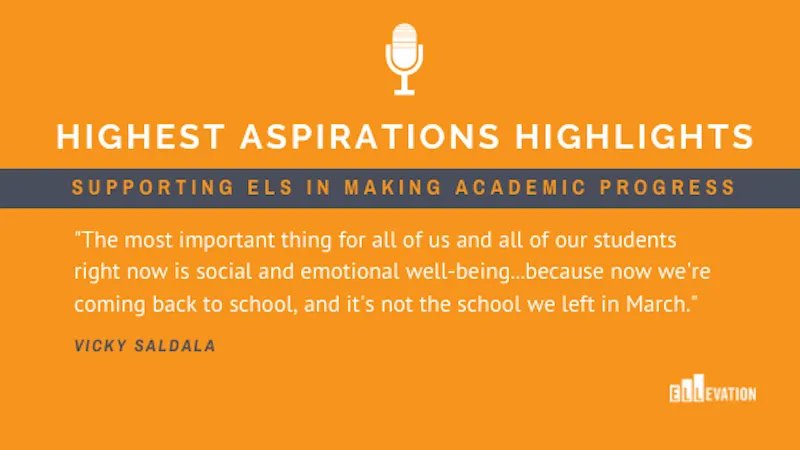5 Tips to Identify and Mitigate Learning Loss Among English Learners


5 Tips to Identify and Mitigate Learning Loss Among English Learners
The issue of learning loss has quickly become the pandemic within the pandemic, with many students at risk for falling behind in school. We know a cookie cutter approach to addressing this issue and the social-emotional component that comes with it won’t work, especially for special populations like English learners. Our recent guest has some insight into what will.
Vicky Saldala, Director of the Bilingual /ESOL Department for Broward County Public Schools in Florida and contributor to the In This Together docuseries, shares some tips on how to support “Adequate Academic Progress” - from identifying and facilitating outreach for 59,000 students that need extra support, to implementing personalized intervention opportunities that reach upwards of 300 students each night.
1. Define learning loss in your context.
In Broward, Vicky and her team started by adopting the term “Adequate Academic Progress (AAP),” which they felt took on a more asset based approach than “learning loss.” They set out to include not only students who showed lagging skills, but also those who were at the beginning levels of language proficiency. Many students in the latter group are new to Broward and have not been in a district school since they arrived after the pandemic. Understandably, the team wanted to get those students into school as soon as possible.
2. Identify students not making adequate academic progress.
To identify students not making adequate academic progress, Vicky and her team used the Ellevation platform and the expertise of their assessment team to make sense of available student data on language proficiency, reading and math levels and content area performance. When they identified 59,000 students who were not making AAP (9,300 of whom were ELs who were still at home), they reached out to families to invite and encourage them to send their students back to the school.
3. Equip teachers with the skills and resources they need.
Recognizing that teachers have been inudundated with training on new instructional practices for remote learning, Vicky and her team are taking a pedagogy-first approach to professional development. They have been deliberate about reminding teachers what language acquisition looks like before guiding them on how tried and true strategies can be implemented in a remote environment. Instructional techniques like pre-teaching academic language are still best practice, but they may look different in a virtual classroom. Vicky also integrates ELL instructional strategies throughout PD rather than in isolated sessions because “good strategies for English learners are good for all students.”
4. Take a personalized approach to interventions.
When after school tutoring sessions had lackluster attendance, Broward took a more personalized approach to intervention with a one-on-one homework help-line that receives hundreds of calls from students each night. Vicky’s team also noticed that math was a content area where many students were struggling with learning loss, and is offering spring and summer enrichment camps as an opportunity to reinforce content while also building in time for play with more experiential learning and partnerships with community members.
5. Use learnings to come back stronger.
Remote learning has forced districts to accelerate efforts to deploy devices and internet access at home and for teachers to utilize technology for instruction. Vicky notes that even when we are all safely back at school, we will have the opportunity to incorporate this innovation into the traditional school setting. “We need to look at everything that's happened as a learning opportunity, not to go back to how we used to teach, but how do we take what we’ve learned to move forward.”
_______________________________________________________________________________________
To get access to strategies and resources from experts in multilingial education, join the almost 10,000 educators in our ELL Community - its free!